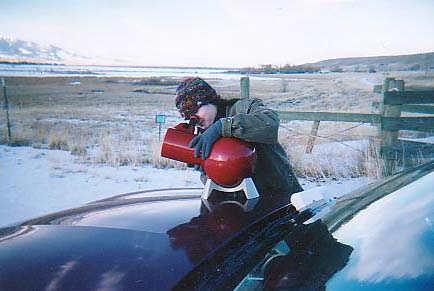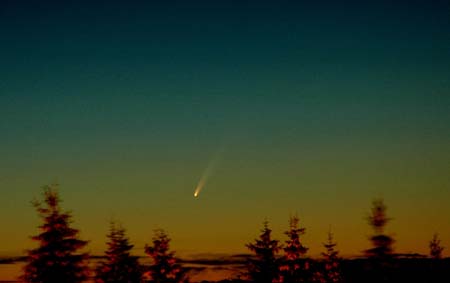Not Even Close to
All For McNaught
by Deb Lewis
We've been comet chasing. Mornings to the east, evenings to the west, we've been looking for that darn comet and seeing mostly clouds. But that's what winter is like in Montana, some bright spots and plenty of gray. This isn't my son's first comet. During a road trip in 1996 when Dylan was four years old, we watched comet Hyakutake from Montana to Arizona to Arkansas and back again. Then in 1997, we waved good morning and good night to comet Hale-Bopp those months it lingered in the sky.
 This comet is the first to appear since my son got his telescope, so it's a potentially WOW! kind of comet if we could just get a look at the thing. This morning we sat in the car, up on the hill waiting for the sunrise, the temperature outside a snappy ten below zero, and while all the sky around was clear, that patch just above the eastern horizon was heavy with clouds.
This comet is the first to appear since my son got his telescope, so it's a potentially WOW! kind of comet if we could just get a look at the thing. This morning we sat in the car, up on the hill waiting for the sunrise, the temperature outside a snappy ten below zero, and while all the sky around was clear, that patch just above the eastern horizon was heavy with clouds.
The comet was elusive, but the clouds were stunningly beautiful with the sun burning behind them. The moon hung on for us as the sky turned that powdery blue of early morning. When there was finally enough light to see down into the valley, we counted deer all around us in the fields. And as the morning brightened, we could see tiny frost crystals shimmering in the air like glittering confetti. We didn't see the comet, but as we drove home we didn't feel like we'd missed anything at all. We had gone to find one thing but found other things instead. The comet was there, shooting toward the sun whether our eyes saw it or not, and it turns out, that's ok.
I think unschooling is better when we can be surprised or inspired even when things aren't going exactly as we planned, when we can welcome what comes, even if it wasn't what we expected.
I'm not saying unschooling parents should gloss over disappointments or pretend nothing is wrong if a child is frustrated by plans gone awry. A let down hurts. It's a bummer. It's discouraging when something that should happen doesn't happen, and parents should be understanding and offer the kind of sympathy they themselves would appreciate under similar circumstances.
But I think being able to see that the world is still interesting, to see possibility and adventure even in the face of disappointment is a useful tool. It can help us cope, and it can be an example for our kids of a choice other than grumpiness or gloom.
Researchers say depression is often an illness that occurs in successive generations of a family. Depression is certainly more complex than attitude and adaptability, but if there's a chance at all that our own approach to the world and our own decisions about how we face life's disappointments can help our kids learn to see possibility instead of defeat, then I think a parent's ease with change and awareness of other possibilities can only be good.
The ability to welcome what comes along is part of living joyfully.
Once on an email list I was asked whether I thought I might be altering my son's psychology because my goal as a parent was (and is) a life of joy. I said I'd take that chance! Of all the ways we can affect our kid's psychology, offering examples of flexibility, adaptability, and delight seem to me to be on the bright end of the spectrum.
Comet spotting plans and recent aurora watching plans that failed to result in us seeing comets or aurora's were not just about a celestial light show. They were about doing something together, making plans together, good conversation, warm blankets, and hot chocolate. Those little adventures were a kind of package deal of fun time spent in enjoyable company, so when one part of that package was lost, there was enough joy and interest to keep the moment from going sour.
An evening when auroras failed to show turned into a chance to talk about our favorite, old science fiction movies. We saw satellites, and we were happily surprised by a space station fly-over. I told the story again about waiting on my front porch steps for a UFO to take me away. We looked for constellations we knew. We wondered if the people who made the Chauvet cave paintings spent so much time drawing on cave walls that they missed a season of spectacular auroras or comets, and we wondered how many people would get to see those drawings in the next hundred years. Will it be more people than will see auroras? We wondered if any humans would be left on earth the next time comet Hyakutake comes around, seventy two thousand years from now.
I know there will be other nights and early mornings for sky watching. And I know if my kid misses the next big comet, he'll still be able to marvel at the night sky or the sunrise or the quiet presence of deer. I know when life brings bigger disappointments, he'll be ok, and he'll be able to adapt and keep an open mind and see other possibilities ahead.
So even if we don't get to see comet McNaught, we'll have nice memories. We'll aim the telescope at Mars or Saturn or take a picture of the moon to remind us what we were doing that week we couldn't find the brightest comet in forty years.
Deb Lewis lives a happy unschooling life in Montana with her husband David and son Dylan. She's a part time floral designer, potter, poet, gardener, trampoline bouncer and bird watcher and a full time unashamed idealist.

"McNaught as seen by a researcher at University of Oslo"
This was first published in Connections e-zine, Issue 5, March 2007.
(not archived)
A side-table appeared with the original article, with these links:
Cool Connections
- Hayakutake
- Hale-Bopp
- HB vs. Hayakutake
- McNaught
- Professor Astronomy
In 2025, I disabled the links because every site was gone, but you can use the terms to search for newer, better info.
More by Deb Lewis

Science

Typical Days of Unschoolers

 This comet is the first to appear since my son got his telescope, so it's a potentially WOW! kind of comet if we could just get a look at the thing. This morning we sat in the car, up on the hill waiting for the sunrise, the temperature outside a snappy ten below zero, and while all the sky around was clear, that patch just above the eastern horizon was heavy with clouds.
This comet is the first to appear since my son got his telescope, so it's a potentially WOW! kind of comet if we could just get a look at the thing. This morning we sat in the car, up on the hill waiting for the sunrise, the temperature outside a snappy ten below zero, and while all the sky around was clear, that patch just above the eastern horizon was heavy with clouds.
